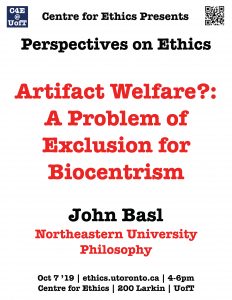
Artifact Welfare?: A Problem of Exclusion for Biocentrism
Biocentrism is the view that all and only living things have moral status or are deserving of direct moral concern. The project of defending Biocentrism includes adopting some strategy for excluding various kinds of things – biotic communities, ecosystems, species, and artifacts – from the domain of direct moral concern. This talk aims to showcase the failures of this strategy of exclusion specifically in the case of artifacts. The standard line for the Biocentrist is to argue that these things fail to meet the conditions for having a welfare or well-being, a necessary condition for having moral status of the relevant kind. The Biocentrist has, for good reason, typically adopted a view of non-sentient welfare that is teleological, grounding the welfare of non-sentient organisms in their goal-directed behaviors, and where pushed to articulate an account of goal-directedness, they have typically appealed to etiological account of function or teleology. When it comes to excluding artifacts, the reason artifacts are taken to lack a welfare is that, while goal-directed, their goal-directedness is derivative on our goals; whereas natural selection grounds genuine teleology, artificial selection does not. I explain why this appeal to natural selection can’t do the work the Biocentrist requires and consider a range of alternatives finding each lacking.
☛ please register here
John Basl
Northeastern University
Philosophy
Mon, Oct 7, 2019
04:00 PM - 06:00 PM
Centre for Ethics, University of Toronto
200 Larkin
